 W
W1Q84 is a dystopian novel written by Japanese writer Haruki Murakami, first published in three volumes in Japan in 2009–10. It covers a fictionalized year of 1984 in parallel with a "real" one. The novel is a story of how a woman named Aomame begins to notice strange changes occurring in the world. She is quickly caught up in a plot involving Sakigake, a religious cult, and her childhood love, Tengo, and embarks on a journey to discover what is "real". Its first printing sold out on the day it was released and sales reached a million within a month. The English-language edition of all three volumes, with the first two volumes translated by Jay Rubin and the third by Philip Gabriel, was released in North America and the United Kingdom on October 25, 2011. An excerpt from the novel, "Town of Cats", appeared in the September 5, 2011 issue of The New Yorker magazine. The first chapter of 1Q84 had also been read as an excerpt in the Selected Shorts series at Symphony Space in New York.
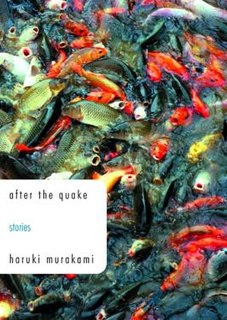 W
Wafter the quake is a collection of six short stories by Japanese author Haruki Murakami, written between 1999 and 2000. First published in Japan in 2000, it was released in English as after the quake in 2002.
 W
WBefore the Dawn is Tōson Shimazaki's most famous historical novel. It was originally published in Chūōkōron in 1929 as a serial work. Shinchosha later published the work in novel form, with the first part being released in January 1932 and the second part being released in November 1935. It started with the phrase "The entire Kisoji is in the mountains". The Kisoji ran through Shimazaki's hometown in Gifu Prefecture, Japan.
A Blank in the Weather Map is a non-fiction book written by Japanese author Kunio Yanagida and published in Japan in 1975. The book is about the Hiroshima Meteorological Observatory in 1945. Hiroshima was fully destroyed in the Atomic Bombing on August 6, 1945.
 W
WThe Decay of the Angel is a novel by Yukio Mishima and is the fourth and last in his Sea of Fertility tetralogy.
 W
WDensha Otoko is a Japanese movie, television series, manga, novel, and other media, all based on the purportedly true story of a 23-year-old otaku who intervened when a drunk man started to harass several women on a train. The otaku ultimately began dating one of the women.
 W
WThe Face of Jizo is a Japanese play written by Hisashi Inoue.
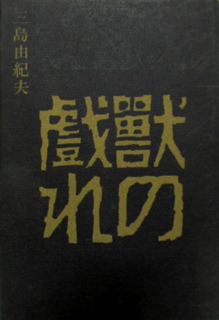 W
WThe Frolic of the Beasts is a 1961 novel by Yukio Mishima. Drawing inspiration from Noh plays, specifically the 14th-century Motomezuka, the novel centers on a tragic love triangle depraved by adultery and violence. It is a short novel in length and has a nonlinear narrative structure. The novel was first serialised thirteen times in the weekly magazine Shukan Shincho between 12 June 1961 and 4 September 1961. It was published in hardcover format by Shinchosha on 30 September 1961. It was published in paperback by Shincho Bunko on 10 July 1966. The novel was translated into Italian by Lydia Origlia and published by Feltrinelli in September 1983. The novel was translated into English by Andrew Clare and published in paperback format in the United States and Canada by Vintage International on 27 November 2018. Clare's translation was later published in paperback in the United Kingdom by Penguin Modern Classics on 4 April 2019.
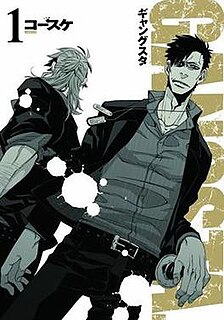 W
WGangsta is a Japanese manga series written and illustrated by Kohske. It has been published in Shinchosha's Monthly Comic @BUNCH magazine since 2011. The series has inspired a spin-off manga, an audio drama series, an anime television series, and an original novel.
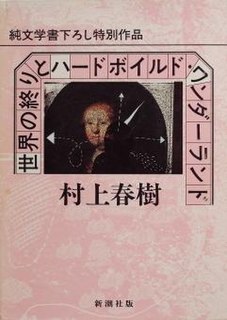 W
WHard-Boiled Wonderland and the End of the World is a 1985 novel by Japanese writer Haruki Murakami. The English translation by Alfred Birnbaum was released in 1991. A strange and dreamlike novel, its chapters alternate between two bizarre narratives—"Hard-Boiled Wonderland" and "The End of the World".
 W
WKani Kōsen is a 1929 novel by Japanese author Takiji Kobayashi.
 W
WKilling Commendatore is a 2017 novel written by Japanese writer Haruki Murakami. It was first published in two volumes–The Idea Made Visible and The Shifting Metaphor , respectively–by Shinchosha in Japan on 24 February 2017. An English translation by Philip Gabriel and Ted Goossen was released as a single, 704-page volume on 9 October 2018 by Alfred A. Knopf in the US and by Harvill Secker in the UK.
 W
WLike the Clouds, Like the Wind is an anime television film in Japan produced by Studio Pierrot for NTV and based on the novel by Ken'ichi Sakemi. It is often incorrectly thought to be produced by Studio Ghibli due to the character designs by Katsuya Kondō, partially due to an error in its first fan translation that attributed the screenplay to Hayao Miyazaki instead of Akira Miyazaki, and the higher-than-average quality of the animation for a TV movie. However, Studio Ghibli had no involvement in the film.
 W
WMoribito II: Guardian of the Darkness is the second book in the Moribito series, a series of fantasy novels by Japanese author Nahoko Uehashi. It was written in 1999 and published by Kaisei-Sha Publishing Co., Ltd. in hardcover format and by Shinchosha in bunkoban format. The English translation was published in 2009 by Arthur A. Levine Books, an imprint of Scholastic. The novel follows the main character of the first book, Balsa, as she returns to her home country following the events of Moribito: Guardian of the Spirit. The title refers to the mysterious spirits known as hyohlu who play a large role in the book.
 W
WMoribito: Guardian of the Spirit was published in 1996. It is the first in the 12-volume Moribito (守り人) series of Japanese fantasy novels by Nahoko Uehashi. It was the recipient of the Batchelder Award An ALA Notable Children's Book in 2009. It has since been adapted into numerous media, including radio, manga, anime, and taiga drama adaptations. Scholastic released the first novel in English in June 2008. Media Blasters has confirmed that they acquired the rights to the anime. The series premiered on Adult Swim in the U.S. at 1:30 a.m. on August 24, 2008 EST, but was dropped from the schedule without warning or explanation on January 15, 2009 after two runs of the first ten episodes. The program returned to Adult Swim during the summer 2009 line-up with an airing of the entire series.
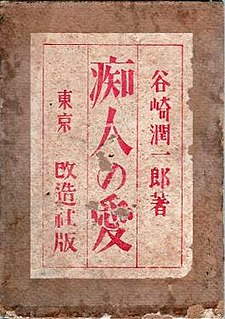 W
WNaomi is a novel by Japanese author Jun'ichirō Tanizaki (1886–1965). Writing of the novel began in 1924, and from March to June, Osaka's Morning News published the first several chapters of the serial. Four months later, the periodical Female started to publish the remaining chapters. The novel was first published in book form, by Kaizosha, in 1925.
 W
WA Personal Matter is a novel by Japanese writer Kenzaburō Ōe. Written in 1964, the novel is semi-autobiographical and dark in tone. It tells the story of Bird, a man who must come to terms with the birth of his mentally disabled son.
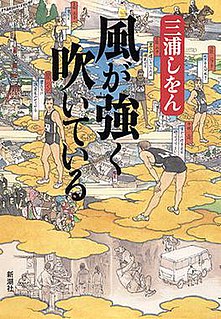 W
WRun with the Wind is a 2006 Japanese novel by Shion Miura. The novel has received a manga and a live-action film adaptation, as well as an anime television series adaptation by Production I.G that aired from October 2, 2018 to March 26, 2019.
 W
WRunaway Horses is a 1969 novel by Yukio Mishima, the second in his Sea of Fertility tetralogy. Mishima did much research to prepare for this novel, including visiting locations recorded in the book and searching for information on the Shinpūren Rebellion. Japanese critics initially reviewed Runaway Horses negatively.
 W
WThe Sea of Fertility is a tetralogy of novels written by the Japanese author Yukio Mishima. The four novels are Spring Snow (1969), Runaway Horses (1969), The Temple of Dawn (1970), and The Decay of the Angel (1971). The series, which Mishima began writing in 1964 and which was his final work, is usually thought of as his masterpiece. Its title refers to the Mare Fecunditatis, a lunar mare.
 W
WShiki is a horror novel by Japanese novelist Fuyumi Ono. It was originally published in two parts by Shinchosha in 1998, it was then reprinted into five parts in 2002. A manga series adapting the story, drawn by Ryu Fujisaki was serialized in the Japanese monthly magazine Jump SQ. from December 2007 to June 2011. An anime adaptation of the manga by Daume began broadcasting on Fuji TV from July to December 2010. North American anime distributor Funimation simulcasted the series on their online video portal and released the series on DVD & Blu-ray in May 2012.
 W
WSpring Snow is a novel by Yukio Mishima, the first in his Sea of Fertility tetralogy. It was published serially in Shinchō from 1965 to 1967, and then in book form in 1969. Mishima did extensive research, including visits to Enshō-ji in Nara, to prepare for the novel.
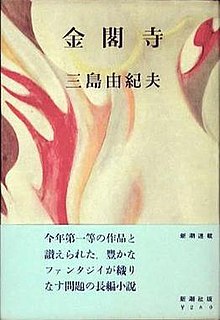 W
WThe Temple of the Golden Pavilion is a novel by the Japanese author Yukio Mishima. It was published in 1956 and translated into English by Ivan Morris in 1959.
 W
WUten Enten (雨天炎天) is a road essay by Japanese author Haruki Murakami, about his travels in Greece and Turkey. The essays were first published in Japanese in 1990 by shinchosha as two separate volumes, the first volume covering his travels in Greece, and the other his travels in Turkey. A popular edition collecting both volumes was published in 1991. In 2008 a renewal edition was published with some new photographs.
 W
WThe Wind-Up Bird Chronicle is a novel published in 1994–1995 by Japanese author Haruki Murakami. The American translation and its British adaptation, dubbed the "only official translations" (English) are by Jay Rubin and were first published in 1997. For this novel, Murakami received the Yomiuri Literary Award, which was awarded to him by one of his harshest former critics, Kenzaburō Ōe.